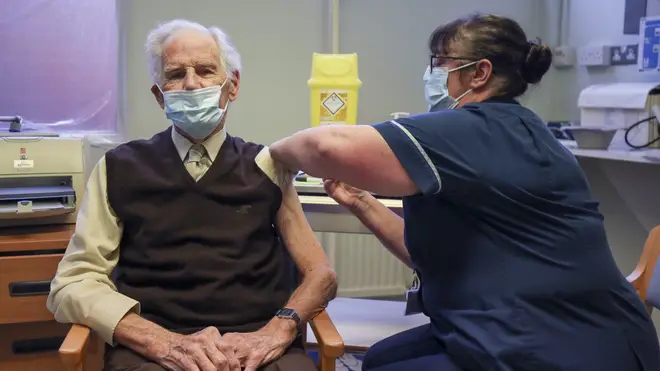
Nick Abbot 10pm - 12am
15 December 2020, 10:00 | Updated: 15 December 2020, 11:01

Vaccinating the entire UK population against Covid-19 could take a year even if there are no interruptions, leading scientists have warned.
Sir Jeremy Farrar, director of the Wellcome Trust and a member of the Scientific Advisory Group for Emergencies (Sage), said the rapid development of vaccines in response to the Covid-19 pandemic was a "remarkable achievement".
But alongside Professor Tim Cook, a consultant in anaesthesia and intensive care medicine, he added there is still a long way to go.
READ MORE: Redundancies soar to record high as coronavirus hammers UK jobs
READ MORE: Downing Street under pressure to drop Christmas Covid rules easing
They wrote in the journal Anaesthesia: "The scale of the vaccination programme should not be underestimated: 1,000 vaccination centres each vaccinating 500 people a day for five days a week, without interruptions of supply or delivery, would take almost a year to provide two doses to the UK population.
"No country has mounted a whole population vaccination campaign in living memory and it will need to be undertaken with local leadership and cultural sensitivity."
It is estimated that about 20 per cent of the UK population may decline to receive the vaccine, but the authors said if 80 per cent of people have the jab "there would finally be the prospect of a degree of population (herd) immunity".
This would "reduce virus transmission in the community to very low levels and protect both those who are vaccinated and those who are not."

Government Minister says Christmas mixing is 'under review'
It would be achieved "without the cost of an estimated half a million UK deaths", unlike "population immunity following natural infection", they added.
However the authors said it may be that early vaccines prevent serious illness rather than stopping the virus from being passed on.
"From pre-clinical studies, it is possible that the first vaccines, likely to be released in late 2020, may be more effective in preventing disease progression and hospitalisation and less effective in preventing transmission," they said.
They said gathering ongoing data as vaccines are used will mean that "improved second and third generation vaccines may be available later in 2021 and beyond".
They also warned vaccines will not be "a final solution to Covid-19".
They said: "This is now a human endemic infection, which will not disappear, and like all infectious diseases, we will need to learn to mitigate its impact through adapting our behaviour and access to diagnostics, treatments and vaccines. "